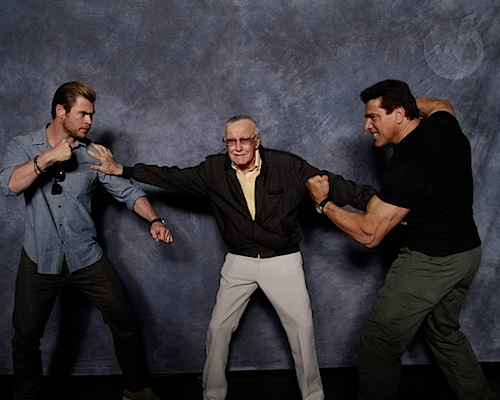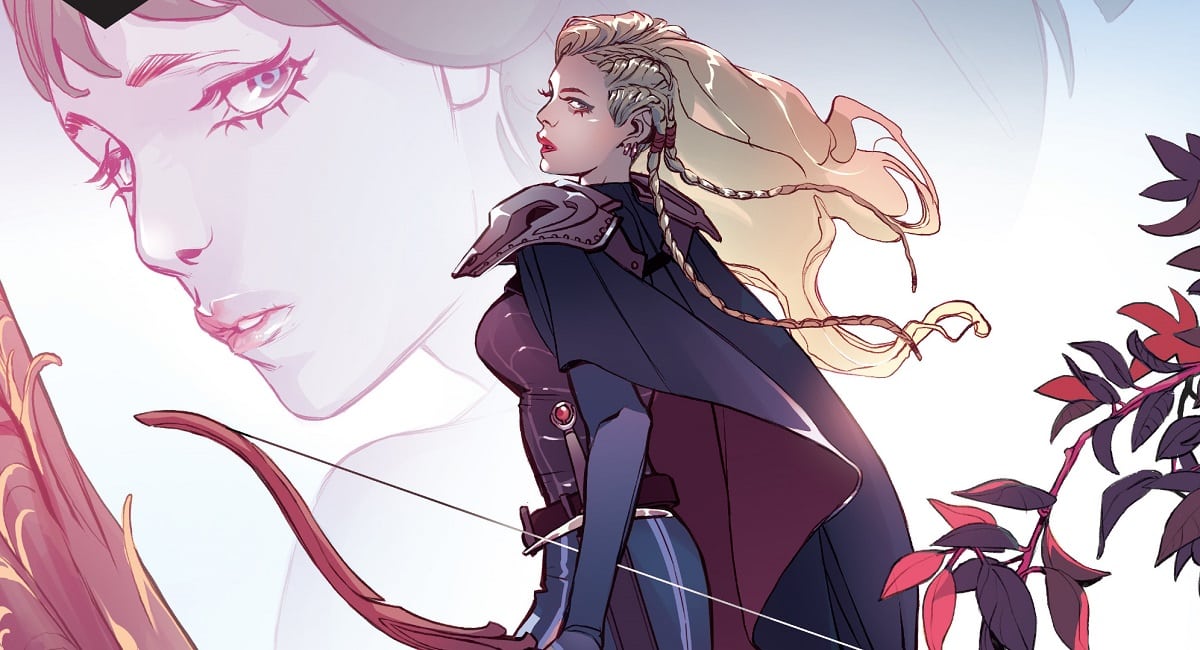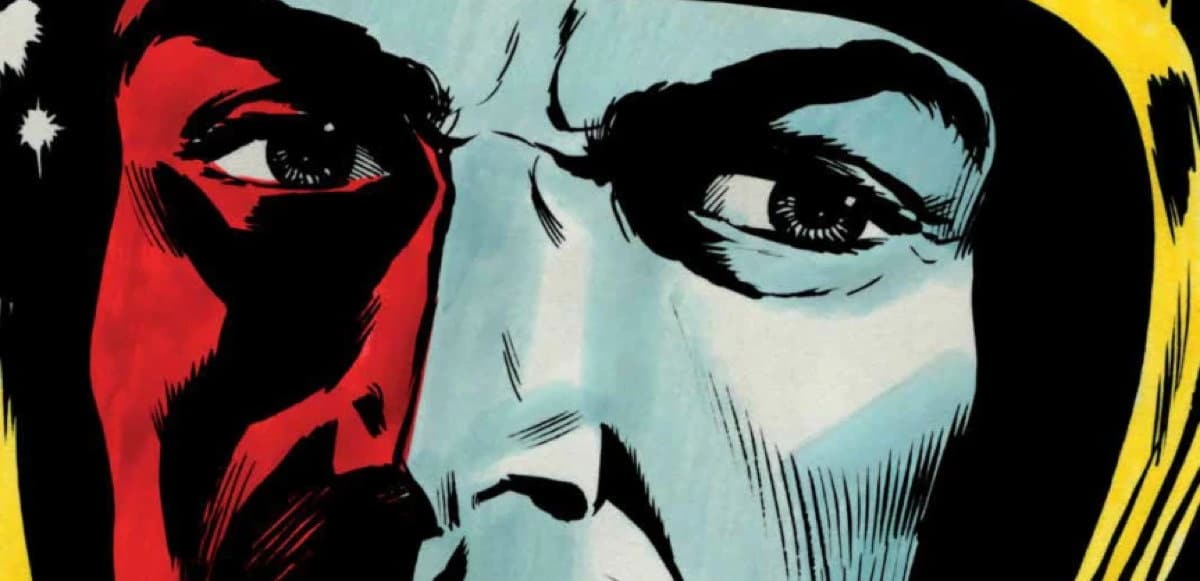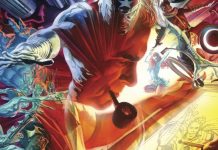[Stan Lee answers the greatest question of all: who would win, Thor or the Hulk in this shot from the Wizard World FB page.]
Playboy has a long interview with Stan Lee here (link NSFW but not really as much as you’d think), Normally I’d call this an “autumnal” interview, but under the circumstances, it’s more…the lion in winter. Lee, perhaps realizing this is one of the few spots he has to dig in a little, sometimes avoids the kind of jokes and spin he uses in other interviews. And while his memory is always spotty (and any Lee interview includes may places where he takes the question and moves the answer to more familiar territory) his grasp on things is still pretty sharp all things considered. This is truly a “you need to read the whole thing” interview, as he discusses Kirby and Ditko at length, discussing the last time he saw Ditko (10 years ago) attending Kirby’s funeral 20 years ago and staying in the back (something I can attest to as I was there) but ultimately saying he did the best he could by them. And that’s his final word, I’m sure. But I’m sure this interview will eventually get some vetting. Mark Evanier has already noted that there is a LOT to dispute:
A lot of the history is not only at odds with my understanding but it’s different from things Stan has said in the past, both in print and in private conversations. I suspect an upcoming issue of Playboy will feature a letter from Steve Ditko saying much the same thing.
That said, there is still a lot of vintage Stan:
You have to understand that growing up during the Depression, I saw my parents struggling to pay the rent. My father was always unemployed, and when he did have a job, he was a dress cutter. Not very much money there. I was happy enough to get a nice paycheck and be treated well. I always got the highest rate; whatever Martin paid another writer, I got at least that much. It was a very good job. I was able to buy a house on Long Island. I never dreamed I should have $100 million or $250 million or whatever that crazy number is. All I know is I created a lot of characters and enjoyed the work I did.
And memories of WWII:
PLAYBOY: You went off to the Army in World War II and wrote military pamphlets with an elite group that included Frank Capra, William Saroyan and Theodor Geisel. What’s your standout memory?
LEE: That Dr. Seuss was slow. In the comic-book world, you live and die on your speed, but Geisel was slow. Most of them were slow. I was writing faster than all of them. One day the major who was in charge of our unit said, “Sergeant, will you work a little slower? You’re making the other guys look bad.” I wrote all these training films about things I had no knowledge of. I remember I did one film, The Nomenclature and Operation of the 16 mm IMO Camera Under Battle Conditions. What got the most attention, though, was something I wrote about venereal disease.
I think Lee has slowed down a bit over the last few months. Since his lawyer Arthur Lieberman died in 2012, we’ve seen a lot less “pacting”. I haven’t seen Stan showing up at quite as many comic-cons of late, although he’s confirmed for Dubai. Certainly the guy has earned a wee rest, and whatever the sins of his past, Stan’s late in life resurgence has allowed fans of all ages to connect with a living myth.








Stan will be with me at MEGACON this weekend. I am hosting his panel. It’s always a fun gig for me.
Within his (perhaps common) standards, Lee may well have done everything he could possibly have done for Kirby and Ditko .. and that’s the problem.
History is written by the victors…and Kirby & Ditko lost a loooong time ago.
@Snikt Snakt:
Kirby & Ditko didn’t lose anything that matters – and if respect and influence are any standard of victory – then Jack and Steve are two of the biggest winners who ever lived.
The ones who really lost are those who stood for nothing.
Stan finally admits that he’s a millionaire, something he really never talks about much, but he was a millionaire as far back as the 1970s. I interviewed Mike Ploog in the early 1980s and he told me a story about going in to Stan in the 1970s to ask for a five dollar a page raise. Stan turned him down and then proceeded to show Mike pictures of Stan’s Rolls Royce collection. Rolls Royce, the full size car, not toys. Finally Mike couldn’t stand it any more and blurted out, “You can’t give me a $5.00 a page raise and you’re showing me pictures of your Rolls Royce collection?!” Stan paused, thought about it, did not get angry but instead stated, “You’re right. I will give you the $5.00 a page raise.”
No one can accuse Evanier from straying off-message. But to the OP: “truth?” These are the words of a 91 year old man reflecting on events 10, 20 to 40 years ago that he was intimately involved in at those times. Take them for what they are; no more, no less.
The truth certainly includes Lee’s perceptions as it does Ditko’s and Kirby’s, and even Evanier’s.
To repeat Lee, “can we get philosophical?”
It takes more than one to disagree. None of us, and not even any of them singularly, can know the (whole) truth. We can only know the collective of life experiences that the participants have been willing to share.
Silly but True
Comics and the people who create them are sometimes so different that it’s painful and sad. I long for a happy ending, with Stan recanting or doing some sort of noble act to help Kirby’s family, or to make peace with Ditko after all these years. It’s the sort of thing that happens in the imagination of comics, time after time, but it hardly ever happens in the real lives of the people who make those comics.
I also wish Stan could see that his legacy is so tarnished by the way this has all gone, and that it will never get better. Maybe Stan’s much tougher and meaner than we give him credit for being.
I find it pretty amazing that after all these years, people STILL blame Stan for the horrible crap Martin Goodman did to people in the 60’s.
Like him or not, this 91 year old is the only recognizable person the general public can associate with comic books. People know his name and his face. Stan Lee IS comic books. Who will speak to the public when Stan is gone? The Comic Book Men?
As it seems we have entered a new era of human history – one in which huge entities seem to be in the business of not so much owning everything as de-monitizing everything but what they do not own – the world needs some new paradigm (to compensate not only the rights of artists but any body making anything of value).
I would urge those interested in this issue to take a listen to Jaron Lanier and his ideas about tailoring algorithms for produce micro-payments. He was on Charlie Rose the other night:
http://www.charlierose.com/watch/60362672
He’s a real start.
I find it interesting that Stan’s truthfulness is being called into question in the headline of the article itself. A pity no one ever thought to headline any of Kirby’s ranting interviews that way–you know, the ones where Kirby asserted that he created Spider-Man or that Stan never wrote a single thing for any of his artists. Stuff that was demonstrably untrue and was in fact legally actionable under libel laws. (That old villain Stan Lee never took the matter to court though, even when lawyers advised him to.) But, that’s right–whenever Kirby outright lied, it was just his “faulty memory”. I guess Stan doesn’t get to use that excuse since inevitably his coverage on comic book related “news” sites is completely dependent on his popularity with the editor, rather than, you know, something as trite as journalistic standards.
Having read Sean Howe’s book on Marvel Comics, it’s clear to me that while Stan at some point obviously became a “suit,” he always saw himself as a creator and beholden to the powers that be, rather than a person with any influence on the corporate/financial side. Or at least that’s how he portrayed himself, using this as his justification to say “no” to people. His career has always shown he’s been more loyal to the company and the brand (even when he was suing them) than the creators. He was well compensated for this, so he certainly can afford to be loyal to the company.
I really wish comics journalism would grow beyond the fan-boy need to take sides and create heroes and villains.
“Comics and the people who create them are sometimes so different that it’s painful and sad. I long for a happy ending, with Stan recanting or doing some sort of noble act to help Kirby’s family, or to make peace with Ditko after all these years.”
So Stan should respond to years of hostility directed at him by Ditko, Kirby and the Kirby family by recanting and apologizing? Give me a break.
“I find it pretty amazing that after all these years, people STILL blame Stan for the horrible crap Martin Goodman did to people in the 60′s.”
I’ve stopped posting at the Comics Journal site because threads are constantly hijacked by the same handful of grumpy old men, who steer discussions to their favorite topic: How Stan Lee screwed over Jack Kirby in the 1960s. They are obsessed with that subject, and they post about it every day, all day long. I assume they don’t have full-time jobs outside their homes.
Stan is constantly accused of hogging the credit for creating the Marvel Universe, but, like Mark, I remember Kirby’s absurd claims that he created and “wrote” all of Marvel’s comics with no help from anyone. I’ve always wondered how Steve Ditko felt about Kirby’s “ranting interviews.”
Marvel in the Silver Age was a collaboration, although I know from experience that the Kirby-Ditko partisans don’t want to hear that.
Even if it could be proven that Stan Lee never created a character in his life– that every character at Timely, Atlas or Marvel was created by a collaborating artist– I will still believe him the co-creator of Marvel, because I believe he gave life to the trope of “heroes with problems.”
I don’t see either Kirby or Ditko, indubitably the most creative of the 1960s Marvel artists, doing anything similar to this trope in the 1950s. At most you get their characters working through short-term problems that are largely forgotten when each particular story is over.
The trope evolved slowly at first– there’s no trace of it in the earliest stories of Ant-Man or Thor– but I think it was Stan who realized that it could be developed over the long haul. I note that Kirby and Ditko showed only irregular interest in soap-opera dynamics once they quit collaborating with Lee.
“The truth” will never be known. Does Stan contradict himself? Sure, but he does have a good excuse: he contains multitudes.
Uh.. way back up there (somewhere) I meant to say:
As it seems we have entered a new era of human history – one in which huge entities seem to be in the business of not so much owning everything as de-monitizing everything they — DO NOT — own.
Gotta learn to never post while pluckin chicken.
Otherwise: taking a cue David Bird earlier plea (“I really wish comics journalism would grow beyond the fan-boy need to take sides and create heroes and villains”) I yet once again urge folks to give a listen to Jaron Lanier and his ideas about tailoring algorithms for micro-payments, and consider Lanier’s thinking in respect to comic books past, present and future:
http://www.charlierose.com/watch/60362672
I thought the example about Stan bragging about his Rolls Royces and seemingly oblivious to the irony in turning down a $5 per-page raise- until it was brought to his attention, enabling him to see the point- is a great testimony to what I see as the “problem” and the “excuse for” Stan- it isn’t that he’s malicious, he’s just unwitting. And that is not a crime, perhaps it’s a character flaw- Stan really was oblivious to how Jack or Steve felt, because, in his eyes, they never told HIM- and one can see that point of view. Perhaps he should have been more sensitive, surely. My point is just that Stan is more unwitting than evil, and it’d be interesting if the historians could consider this angle rather than paint Stan as a knowingly corrupt tyrant.
Hmmm. I think I don’t blame Stan for Martin Goodman’s horrible crap, but for his own actions – as I’ve read about them. And that includes his testimony in the recent court case with the Kirby family. Has Stan endured hostility? Yeah, some; maybe all the Rolls Royces made it a bit easier for him, though. I wouldn’t worry too much.
It’s easy to decry “fan-boy” journalism regarding comics, but some history does indeed have heroes and villains. Marvel’s treatment of Kirby – aided and abetted by Stan – is on record. That record far from heroic.
I was not saying that Stan didn’t make contributions or have his own brand of wonderful creativity. I also think that Kirby’s greatness was nourished or nurtured by his collaboration with Stan. At first.
But facts are facts. Stan’s legacy was tarnished and will likely always be tarnished by those facts. I get it, though – this interview truly is a “lion in winter” statement, and he won’t ever change. That’s too bad.
“Seemingly oblivious….Stan- it isn’t that he’s malicious, he’s just unwitting..”
>>
@william byron:
Oblivious ?? ..unwitting??? … This is the guy “oblivious” and “unwitting” enough to somehow hang on to enough Spider-Man movie rights, for all those years and years, so to be in such a position where Marvel/Disney felt inclined to pay him 10 Million to finally turn them over — while around the same time he seems to have leveraged those same rights(!) to Stan Lee Media in exchange for what became (at least at one time) a fortune in stock.
Geeeeeez: I wanna grow up to be oblivious & unwitting enough to pull capers like that/LOL.
“Stan’s legacy was tarnished and will likely always be tarnished by those facts.”
Beyond the inside-baseball world of comics fandom — i.e., in the real world — most people don’t know or care about the Stan vs. Jack disputes.
“Fanboy journalism” does deserve to be decried. It’s not just comics; it applies to almost any online criticism (about movies, music, TV, etc.). Most fans have no background in journalism or academia. They’re not equipped to objectively analyze a piece of work and point out the good and bad.
Instead, they praise their heroes (like Kirby and Ditko) as brilliant geniuses whose every work was a masterpiece, while slamming people who don’t meet their standards of coolness (like Stan Lee and Gerry Conway). That’s why these “journalists” are correctly called fanboys.
The story of Marvel and Stan is a story of fantastic business success, of which I have no doubt Stan was a crucial element .. and I am VERY grateful to him for having been at least as frank about it all as he has been (especially some of his observations about the comic book industry in the recent book ).
http://www.twomorrows.com/comicbookartist/media/02stansrolls.jpg
One problem is that fans impose modern sensibilities on the business practices of several decades ago. Martin Goodman spent his career in cheap magazines, at a time when it was standard for the company to own everything and pay the hired help as little as possible. This was also true of DC’s Harry Donenfeld and Jack Liebowitz.
These men — immigrants or children of immigrants, the product of poor families — saw themselves as self-made men. They didn’t feel they owed anything to anyone.
Their attitude was: If Jack Kirby or Jerry Siegel want to own their characters, why don’t they start their own company? Why don’t they become publishers? Or, as Gerard Jones put it, their attitude was: “You want a job with a pension and medical benefits, you GET a job with a pension and medical benefits.”
Horatio,
I simply meant he was oblivious and insensitive in regards to personal interactions and reading other people. Stan was never in the position to have to have empathy, probably. It’s not a defense of him in the slightest. But you can stay swarmy if continuing some kind of argument suits you. No disrespect intended.
I did not defend “fan-boy journalism,” but pointed it that it is an easy charge to make, and one that avoids important issues raised by the article, and by Heidi’s reflections. There sometime really are good people and bad people, and good actions and bad actions. That’s true in history… and in comics history. In the story above, no one was doing what you describe (praising Kirby and Ditko without reservation while unfairly criticizing Lee or Conway). There are important questions, however – how truthful is Stan, and how trustworthy in his discussion of the comics history that’s so important to us? It’s too easy (again) but also flawed (again) to describe such concerns as “inside baseball.” I think Stan has helped rob the Kirby family, and I think that’s important. Not Ukraine-important, not-Global-Warming-important, but not to be dismissed either. As you point out from reading Jones, this kind of abuse was quite prevalent in comics. That shouldn’t make it forgiven or forgotten.
Stan was never in the position to have to have empathy
+
you can stay swarmy if continuing some kind of argument suits you
>>
@william byron:
First one seems empirical to much of the business world, the government world and lots of other worlds that exist within our world (and the next world?) – so I can’t make argument with it, except: I’m pretty sure how far someone is willing to stick their neck out is about the purest demonstration of character (I would rather be Martin Brody than Mayor Vaughn .. but that’s just me)
Otherwise: don’t know “swarmy” so can’t take much offense.
Horatio said:
“This is the guy “oblivious” and “unwitting” enough to somehow hang on to enough Spider-Man movie rights, for all those years and years, so to be in such a position where Marvel/Disney felt inclined to pay him 10 Million to finally turn them over — while around the same time he seems to have leveraged those same rights(!) to Stan Lee Media in exchange for what became (at least at one time) a fortune in stock.”
What’s your source for Stan’s alleged possession of “movie rights?” Though Stan’s word is far from gospel, I tend to believe him when he says that he never has had any rights to any characters. The only thing he controls is his own public reputation, which is valuable to movie studios in terms of publicity.
Horatio said:
“I’m pretty sure how far someone is willing to stick their neck out is about the purest demonstration of character”
In what way do you think Stan should have stuck his neck out? Maybe to have admitted that “Kirby did it all,” which was one of Kirby’s own allegations?
As Stan explicitly says in the interview, he believes that the company bears the fiscal brunt of disseminating the published works, so if they want to deal with them, you accept it as a given that you’re signing away your creations– which Stan himself did.
You can claim that this is not a moral position in your universe, but the fact that Stan subscribes to a different code does not automatically mean that he lacks character.
What’s your source for Stan’s alleged possession of “movie rights?”
>>
From Howe’s book:
Stan Lee sued Marvel (in 2002), claiming he was a profit participant in all Marvel movies — And then: Marvel settled with Lee in 2005 for $10,000,000 – “Stan terminating all RIGHTS .. ” — in addition: Lee continued to receive his yearly salary (800k ?)
@gene phillips :
Yeahh ? … Soooo ?
I haven’t read Howe’s book, but I think you Horatio are conflating two separate things.
Possibly Stan Lee signed whatever theoretical rights to Marvel characters he might possess to Stan Lee Media. That doesn’t mean that he really had any real rights to Marvel characters, and all of Stan Lee Media’s attempts have failed to lay any claim to said franchises have failed, resulting in this salvo from a Disney rep:
“it is clear on its face that the parties to the 1998 Agreement intended it to apply only to characters that Stan Lee was to create after 1998 and that it did not effect any transfer of ownership of characters created as works made for hire more than a half-century ago – nor could it have, as Lee has consistently maintained that he never owned any rights in any historic Marvel character.”
+
My understanding is that what Lee terminated, for a lump sum from Marvel’s owners, was his right to profit participation in the movies. Lee’s old contract gave him that profit participation not because he held copyrights but to keep him on the Marvel rolls for what, in the 1990s, usually amounted to chump change. Once Stan was entitled to the big X-MEN/SPIDER-MAN money, the lawyers went into overdrive to terminate that over-generous arrangement.
I no longer want to grow up to be Stan Lee.
I want to go back in time & get with Stan’s attorney.
lively fellow, he certainly knows how to spin a tail.
thinking also of the comic book history of comics
Comments are closed.